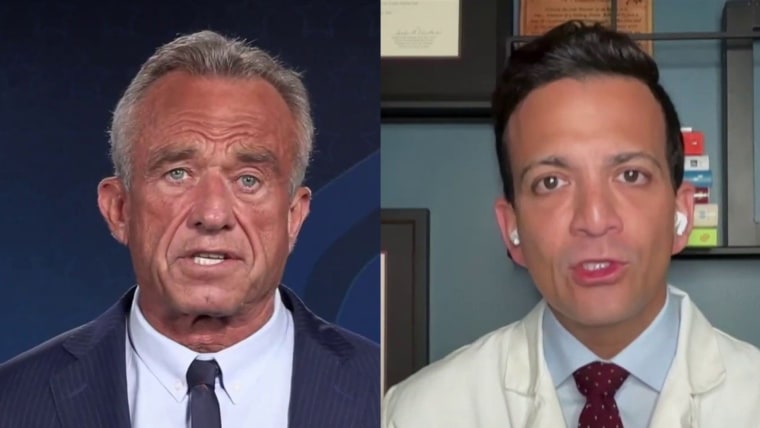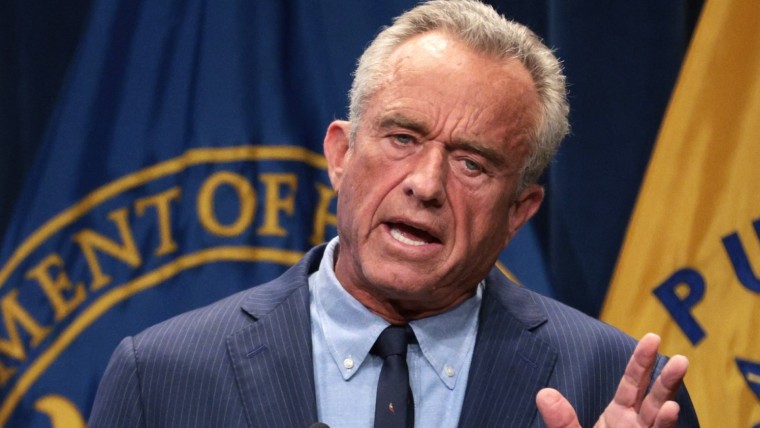Health and Human Services Secretary Robert F. Kennedy Jr.’s decision to terminate $500 million in federal funding for mRNA vaccine development threatens to unravel one of medicine’s greatest recent achievements. His claim that these vaccines “fail to protect effectively against upper respiratory infections like Covid and flu“ represents a fundamental misunderstanding of vaccinology that could cost lives in future pandemics.
As an infectious disease physician who cared for dozens of critically ill Covid patients in December 2020, I witnessed a remarkable shift in the months that followed. As mRNA vaccines became available in early 2021, severe cases among vaccinated individuals became extremely rare. Deaths were almost exclusively among those who declined vaccination, which was tragic given how preventable these outcomes had become.
It sends a troubling message to scientists: why invest in novel platforms if political ideology can defund them despite their success?
No vaccine for respiratory viruses has ever provided complete, lasting protection against all infections. Not the flu vaccine. Not RSV vaccines. That never should have been the expectation. Some vaccines, like those for measles or polio, can effectively prevent infection and transmission, but these target fundamentally different viruses that don’t constantly mutate and reinfect the respiratory tract. The purpose of respiratory virus vaccines is to prevent severe disease, hospitalization and death. By that measure, mRNA vaccines have been revolutionary.
The data confirms what I witnessed firsthand. According to research by the Centers for Disease Control and Prevention, unvaccinated individuals had 53 times the risk of death compared to those who had been fully vaccinated during the Delta wave in 2021. A New England Journal of Medicine study analyzing over 6 million Covid cases found that protection against death remained above 90% and remarkably durable, even as protection against infection declined.
In winter 2020, my hospital’s ICU overflowed with COVID patients. Like many colleagues worldwide, I watched patient after patient die despite our best efforts. It was unlike anything any of us had ever seen. By summer 2021, after vaccines rolled out widely, the change was undeniable. Far fewer patients arrived with respiratory failure. Nursing homes saw deaths plummet.
As vaccine expert Paul Offit stated in December 2020: “All you want to do is keep people out of the hospital and keep them out of the morgue and I think this vaccine can certainly do that.” Even then, before vaccines were widely available, experts understood the real goal.

The speed of mRNA vaccine development was unprecedented. We went from discovering a new virus to having an authorized vaccine in under a year, breaking the previous record of four years. Unlike traditional vaccines that require growing viruses in labs, mRNA vaccines can be designed in days once scientists have the genetic sequence.
The impact has been profound. Studies estimate Covid vaccination saved millions of lives worldwide, with estimates ranging from 2.5 million to 14.4 million. In the United States alone, the Commonwealth Fund found the vaccination program prevented 3.2 million deaths.
Secretary Kennedy’s critique that mRNA vaccines “fail to protect effectively against upper respiratory infections” sets an impossible standard that no respiratory vaccine has ever met. I understand why this distinction can be confusing. Public health messaging hasn’t always been clear, and the unfortunate term “breakthrough infection” made it sound like vaccines had failed when someone got Covid after vaccination. This language was deeply problematic. Getting Covid after vaccination isn’t a sign of vaccine failure. The real measure of effectiveness is staying out of the hospital, avoiding serious complications and surviving what could have been fatal.
The scientists who developed mRNA vaccine technology won the 2023 Nobel Prize in Medicine for enabling “the development of effective mRNA vaccines against Covid-19” during one of the greatest threats to human health in modern times. Now we’re abandoning this proven platform because it doesn’t achieve something no respiratory vaccine has ever achieved.
The scientific consensus is clear: mRNA vaccines saved millions of lives and could save millions more in future emergencies.
The HHS decision affects 22 projects worth nearly $500 million, dismantling infrastructure critical for future pandemic response. Secretary Kennedy promises to invest in “safer, broader vaccine platforms” and mentions “whole-virus vaccines.” But mRNA vaccines have been administered billions of times globally with an excellent safety profile. More concerning, traditional vaccine approaches are far slower to develop. The beauty of mRNA vaccines is that they can be updated within months when viruses mutate or new pathogens emerge.
This decision reinforces the false narrative that vaccines “failed” unless they completely prevent infection. It sends a troubling message to scientists: why invest in novel platforms if political ideology can defund them despite their success?
When the next viral threat emerges, and it will, we may not have the rapid, flexible response that mRNA technology offers. This means slower vaccine development and more lives lost.
Vaccines aren’t some niche drug. We’re talking about medicines that apply to literally every human being on the planet. We should have learned from the Covid pandemic that everyone is potentially susceptible to pandemic threats. The scientific consensus is clear: mRNA vaccines saved millions of lives and could save millions more in future emergencies.
It’s been less than five years since SARS-CoV-2 killed millions worldwide and overwhelmed health systems globally. To abandon the very technology that got us through that crisis is not just shortsighted. It’s reckless.
